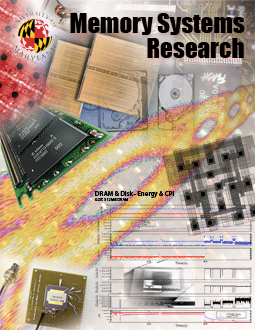Overview: Spring 2007
The memory system in any computer is very complex, comprised of several interacting subsystems, themselves quite complex;
subsystems include DRAMs, disks, caches, and their controllers and busses, each available in many possible configurations.
The memory system is where all important information is stored; as such, it is critical that the memory system be robust,
efficient, and responsive. Modern computers are limited by the memory system to a significant degree: for instance, the
performance of supercomputers from Cray and IBM is entirely determined by memory (Cray observes that
an increase in sustained memory bandwidth of 20% results in an increase in system performance of 20%,
whereas significant increases in processor speed have only negligible impact on system performance).
The complexity of modern memory subsystems and the resulting memory system has recently become a significant problem. To
achieve higher performance, modern subsystems incorporate intelligence in the form of transaction scheduling and local caching
of data, and a wide range of configuration parameters is available for design and implementation at all levels of the system.
We have shown that the interactions between these intelligent subsystems and design parameters is both complex and extremely
detrimental; for instance, we have identified "systemic" behaviors that are non-intuitive, caused by unexpected interactions
between otherwise independent subsystems, and responsible for order-of-magnitude shifts in performance and cost. These are
behaviors only detectable through extremely detailed modeling of the system, a holistic approach to design.
Our work presents a framework in which to study memory systems in a holistic fashion; today, it has become necessary to
consider circuit-level ramifications of system-level design decisions and, as well, to consider system-level ramifications of
circuit-level design decisions. Considering the system at such a level of detail allows one to dramatically improve both the
cost and the performance of the system, and it also guarantees that a chosen design will not fall prey to overlooked details,
such as system level assumptions that violate circuit-level requirements.
Our recent research investigates different facets of the memory system to a significant level of detail. We have developed a highly
detailed model of the memory controller and DRAM subsystem; a full-system model that incorporates detailed performance and
power models of caches, DRAMs, and disks and captures both application and operating-system activity; circuit-level models of
popular low-power SRAM designs to study leakage characteristics, power/performance trade-offs, and noise susceptibility; a
lightweight simulator that captures and measures all memory activity out to several trillion instructions, without sampling;
and a set of data-mining applications that significantly stresses the memory system. We have studied the memory system from
many different perspectives, including the circuit level (e.g., power studies of pipelined nanometer caches at the 90nm, 65nm,
45nm and 32nm technology nodes; the noise susceptibility of low-power SRAMs; etc.), the device-architecture level (e.g., DDR3
and DDR4 device-level parameter studies done on behalf of JEDEC 42.3), and the system level (e.g., power and performance
studies of the upcoming Fully Buffered DIMM architecture; memory-scheduling for power-limited high-performance DDR3 devices;
application behavior beyond 10 billion instructions; characterization of bioinformatics workloads; etc.). It is our ultimate
goal to significantly transform the way memory-system design is done.
Frequently Asked Questions
Here is a brief list of the types of questions we get asked the most often.
Questions asked by people in industry:
- When I try to reproduce other people's results, I can't. When I try to reproduce yours, I can. Why is this?
We validate our simulators against real hardware. This takes a lot of time and a lot of effort, but it
means that what we're doing here is real.
- I like your work, but why don't you publish more?
Several answers to that (see the answer above to get an idea):
1. A real study takes a long time to plan, execute, and write up. It typically takes us about a year to
do a study and write it up. Six to nine months is about as fast as it gets, and that is only possible if there is no
simulator-development work that needs to be done.
I find it hard to believe anyone can do three, four, five studies in a year without
cutting some serious corners.
2. People in academia don't believe our results ... our papers have been rejected from conferences
with comments like, "There is absolutely no way this can be true." We find this amusing. However, the
consequence is that you don't get to see what we've done, although about eight
different unpublished papers on DRAM-systems simulation, design, and performance
characterization wound up in
our book.
3. Much of our research (perhaps half of it) goes into the hands of the people funding us and stays proprietary.
See The Memory-Systems Research Consortium if you want a particular question answered.
Questions asked by students and people in academia:
- Can I have your code?
Uh, yeah, it's on the website.
- When are you going to release the code for XYZ [insert the name of simulator]?
Once it is ready to be released and we've gotten a paper or two out of it.
If you want our code, accept our papers. :)

 -
http://www.ece.umd.edu/~blj/
-
http://www.ece.umd.edu/~blj/